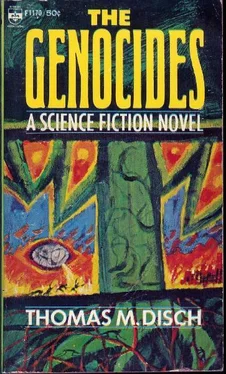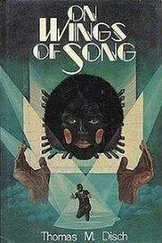The mechanism by which the socialization of the individual Plants took place was very simple. As soon as the first branch roots budded from the vertical primary root, they moved by a sort of mutual tropism toward the kindred branch roots of other Plants. When they met, they merged. When they had merged indissolubly, they diverged, seeking still another union at a deeper level. The many became one.
You had to admire the Plant. It was really a very beautiful thing, if you looked at it objectively, as, say, Jeremiah Orville looked at it.
Of course, it had had advantages other plants hadn’t had. It had not had to evolve all by itself. It was also very well cared for.
Even so, there were pests. But that was being looked after. This was after all, only its first season on Earth.
By the time Anderson, Orville and the other men (those who’d bothered to come) returned from that day’s exploration deeper into the Plant, Mae Stromberg had already disappeared. So had her son’s corpse. In her last hours with the dying boy, she had not said a word or wept a tear, and when he died there had been only that single maddened outcry. The loss of her husband and daughter she had borne much less calmly; she had felt, perhaps, that she could afford to lose them—could afford, therefore, to grieve for them afterwards. Grieving is a luxury. Now she was left only grief.
There were twenty-nine people, not counting Mae Stromberg. Anderson called for an assembly right away. Of the twenty-nine, only the two women still down with pneumonia and Alice Nemerov were absent.
“I am afraid,” Anderson began, after a short prayer, “that we are falling to pieces.” There was some coughing and a shuffle of feet. He waited for it to pass, then continued: “I can’t blame anyone here for Mae’s running off like this. I can’t very well blame Mae either. But those of us who have been spared this last blow and guided here by Divine Providence, those of us, that is to say…”
He stopped, irretrievably tangled in his own words—something that had been happening to him increasingly of late. He pressed a hand to his forehead and drew a deep breath.
“What I mean to say is this: We can’t just lay around eating milk and honey. There is work to be done. We must strengthen ourselves for the trials ahead, and…. And, that is to say, we must not let ourselves go soft.
“Today I have gone down lower into these infernal tunnels, and I found out that the fruit down there is better. Smaller and firmer—there’s less of this sugar candy. I also found that there’s less of this oxygen, which has been… I mean to say that up here we’re turning into a bunch of—what was that word?”
“Lotus-eaters,” Orville said.
“A bunch of lotus-eaters. Exactly. Now this must stop —” He struck his palm with his clenched fist in emphasis.
Greta, who had had her hand up during the latter half of this speech, at last spoke up without waiting for recognition. “May I ask a question?”
“What is it, Greta?”
“ What work? I just don’t see what it is that we’ve been neglecting.”
“Well, we haven’t been doing any work, girl. That’s plain to see.”
“That doesn’t answer my question.”
Anderson was aghast at this effrontery—and from her. Two months ago he could have had her stoned as an adultress—and now the harlot was vaunting her pride and rebellion for everyone to see.
He should have answered her challenge with a blow. He should have quelled that pride by letting it be known, even now, just what she was: a harlot—and with her husband’s brother. That he did not return her attack was a weakness, and everyone could see that too.
After a long boding silence, he returned to his speech as though there had been no interruption. “We’ve got to get the lead out! We can’t lay around like this. We’ll keep on the move from now on. Every day. We won’t sit around in one place. We’ll explore .”
“There’s nothing to explore, Mr. Anderson. And why should we move every day? Why not clear out one space that’s comfortable and live there? There’s enough food in just one of these big potatoes—”
“Enough! That’s enough, Greta! I’ve said all I’m going to. Tomorrow we—”
Greta stood up, but instead of moving forward into the lamplight, she backed away. “It is not enoughi I’ve had enough of you . I’m sick and tired of being ordered around like I was a slave. I’ve had enough of it, I’m through! Mae Stromberg did the right thing when shc—”
“Sit down, Greta,” the old man ordered, his sternness breaking into mere stridency. “Sit down and shut up.”
“Not me. Not Greta. Not any more. I’m going. I have had it. From now on, I do as I damn well please, and anyone that wants to come along is welcome.”
Anderson drew his pistol and pointed it at the shadowy figure outside of the lamp’s full light. “Neil, you tell your wife to sit down. If she don’t I’ll shoot her. And I’ll shoot to kill—by God I will!”
“Uh, sit down, Greta,” Neil urged.
“You won’t shoot me—and do you want to know why you won’t shoot me? Because I’m pregnant. You wouldn’t kill your own grandchild, now would you? And there’s no doubt he is your grandchild.”
It was a lie, a complete fabrication, but it served its purpose.
“My grandchild?” Anderson echoed, aghast. “My grandchild! ” He turned his Python on Buddy. His hand trembled—with rage or simply with infirmity, one could not tell.
“It wasn’t me,” Buddy blurted. “I swear it wasn’t me.”
Greta had disappeared into the darkness, and three men were scrambling to their feet, eager to follow her. Anderson shot four bullets into the back of one of the men. Then, utterly spent, senseless, he collapsed over the feebly burning lamp. It was extinguished.
The man he had killed was Clay Kestner. The fourth bullet, passing through Clay’s chest, had entered the brain of a woman who had leapt up in panic at Anderson’s first shot.
There were now twenty-four of them, not counting Greta and the two men who had gone off with her.
Anderson’s hair was coming out in handfuls. Maybe it would have at his age in any case, but he blamed it on his diet. The meager supplies rescued from the fire had been rationed out in dribs and drabs, and the little corn that remained now was for Maryann and for seed when they returned to the surface.
He scratched at his flaky scalp and cursed the Plant, but it was a half-hearted curse—as though he were peeved with an employer, instead of at war with an enemy. His hatred had become tainted with gratitude; his strength was quitting him.
More and more he pondered the question of who was to succeed him. It was a weighty question: Anderson was perhaps the last leader in the world—a king almost, undoubtedly a patriarch.
Though generally he believed in primogeniture, he wondered if a difference of only three months might not be construed charitably in favor of the younger son. He refused to think of Neil as a bastard, and he had therefore been obliged to treat the boys as twins—impartially.
There was something to be said for each of them—and not enough for either. Neil was a steady worker, not given to complaimngs, and strong; he had the instincts of a leader of men, if not all the abilities. However, he was stupid: Anderson could not help but see it. He was also… well, disturbed. Just how he was disturbed or why, Anderson did not know, though he suspected that Greta was in some way responsible. Considering this problem, he tended to be vague, to eye it obliquely or as through smoked glass, as we are told to observe an eclipse. He did not want to learn the truth if he could help it.
Читать дальше












